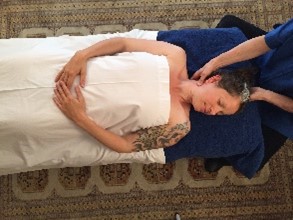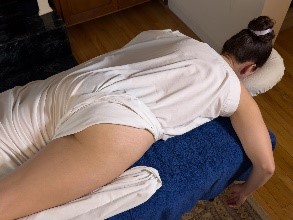Sexual Assault and Poor Draping
20 Mar 2024
Draping in massage therapy means securely covering the body with a sheet, blanket, and/or towel so that the private areas of the body are covered, feel safe, and are not ever exposed. These areas include the genitals, the female breasts, and the lower buttock, where the gluteal cleft is, just below the coccyx bone at the base of the spine.

Draping Creates Safety
Draping creates safety because it sets a physical boundary, exposing only the area being worked on at the moment. Every massage therapist is taught draping at school, and every student practices proper draping hundreds of times and is taught never to work under the drape. Larger companies that offer massage therapy, like spa chains or franchises, usually do additional training in how they want the client draped so that the draping method is the same no matter which spa the client goes to. Draping will often be more conservative at those larger companies than at a private practice, but both are correct as long as the primary principles of safety and security are adhered to.

The draping technique varies depending on the massage school the therapist attended, and there are variations in draping in various parts of the country. However, the goal is the same: to make the client feel safe by covering the private areas of the body with a secure drape.

Poor Draping and Sexual Assault
Massage therapists who are sexual predators will often make the drape very loose so it can easily fall off the body, purposely undrape private areas of the body to sexually assault the client, or inappropriately put their hands under the drape.
In your sexual assault massage cases, you may often hear the phrase, “It was just a draping issue in that previous incident, and we had the therapist retrained,” but the problem isn’t that the therapist doesn’t know how to drape the client. The problem is that they know how (remember: students practice draping hundreds of times) but intentionally drape poorly with clients they choose to sexually assault.
Who Should Investigate
Owners and managers often have an unconscious bias toward their employees and a fiduciary interest. The therapist is a good earner; they hired them and liked them, and they frequently can’t believe or accept that this therapist would do such a thing.
This is why owners and managers should never investigate a claim of sexual assault. First of all, they usually have a bias, but more importantly, they are not trained investigators. Investigating a sexual assault takes a great deal of training and skill. Detectives who investigate sexual assault cases have many years of training.
Investigating Sexual Assault Takes Specialized Knowledge
In addition, investigating sexual assault in a massage context takes specialized knowledge, some of which is outlined in videos I’ve made. Investigators need to understand massage draping technique in detail, why a client’s hands should not be by their sides on the table with their palms up, and where a therapist should be standing in relation to the client’s head when working from the head of the table.
I have interacted with a number of private investigation firms with forensic psychologists, former FBI agents, and former detectives who specialize in investigating cases of sexual assault. These are the people who know how to conduct an impartial investigation. Once they have an orientation to the unique aspects of the massage profession, they do an excellent job.
If you’re a lawyer who is currently involved in a sexual assault case and needs an expert witness with a massage or spa background, schedule a conversation with Dr. Benjamin here.
Ben E. Benjamin holds a Ph.D. in Sports Medicine and has been an expert witness in cases of sexual assault in a massage/spa setting since 2004, advising lawyers, testifying in depositions and trials, and writing reports. His expertise extends beyond massage therapy and ethical behavior. He also advises spas, both large and small, on the creation of comprehensive sexual assault prevention strategies that ensure safe and ethical practices in the industry.
